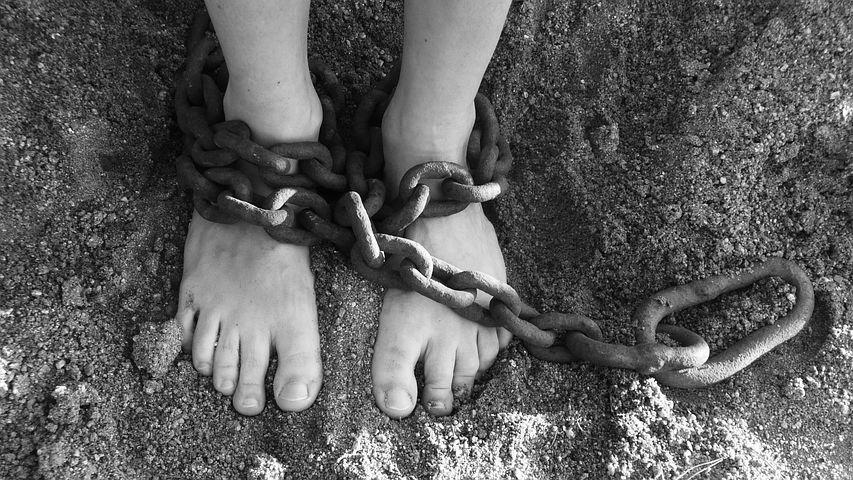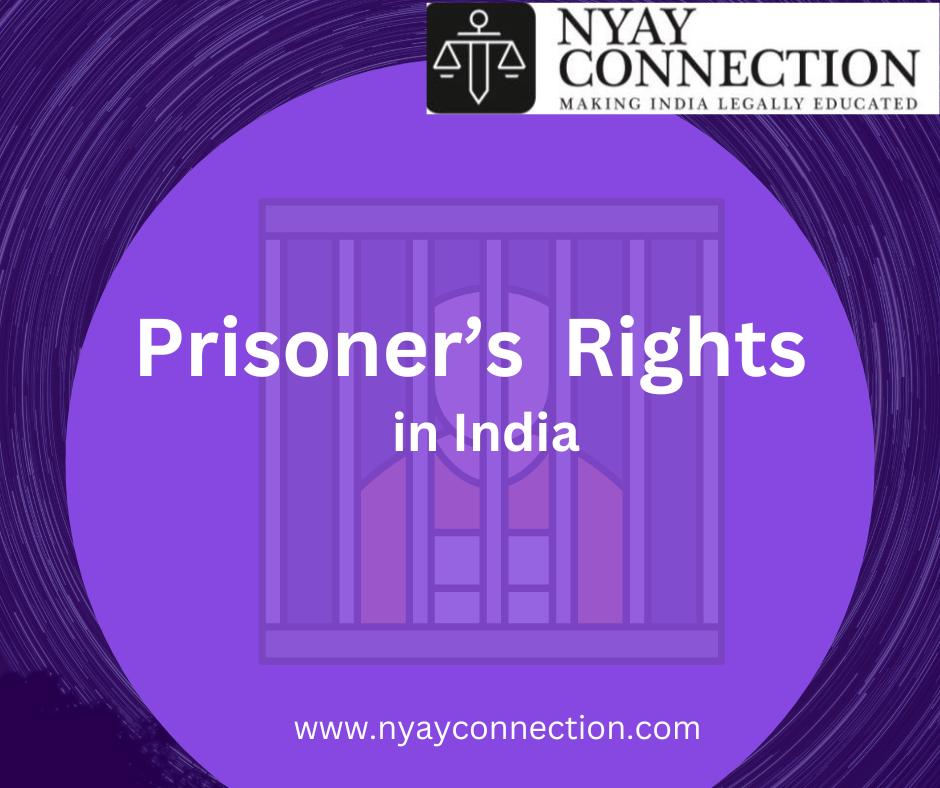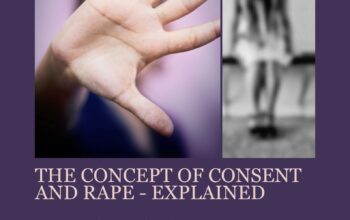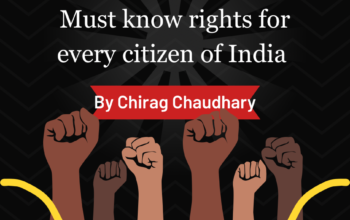PRISONER`S RIGHT IN THE LIGHT OF CONSTITUTION OF INDIA
INTRODUCTION
Any person who is kept under prison for committing an act prohibited by the law is a PRISONER. In the late 18th century prisons were used to confine the debtors and persons awaiting their trials and convicts awaiting the imposition of their sentences. At that time a sentence of imprisonment was rarely imposed for serious crime rather it was only imposed for minor crimes. It was only after the late 18th century that the prisons were increasingly used by the courts as a place for punishment for serious offense as the use of capital punishment began to decline during that era. By the early 20th century, a majority of countries had obtained the death penalty and imprisonment was consequently the most severe form of punishment their courts can impose.
In India where capital punishment is only given in the rarest of the rare cases and almost all the offenses are punished with imprisonment, still the prisons are governed by states under a framework of a century old parent legislation, THE PRISONERS ACT 1894. There is no codified law on Rights of Prisoners which would help to deal with prisoner rights and regulate their conduct in jail. In this scenario the Judiciary has played a crucial role in safeguarding the rights of prisoners. Whenever the legislative and executive has erred, our courts have time to time acted as a saviour for convicts and upheld their fundamental rights.
PRISONER’S RIGHTS IN THE CONSTITUTION OF INDIA
Hence there is no codified law regarding prisoner rights, yet we can carve out the rights that are available to a prisoner in the Constitution. In the landmark judgement of TV VATNEESWARAN VS STATE OF TAMIL NADU 1983, the Hon’ble Supreme court held that the ARTICLES 14, 19 and 21 are available to the prisoner as well as a freeman and a prison will not affect the fundamental rights of any person.
ARTICLE 14
Article 14 states that the state shall not deny to any person equality before the law and equal protection of law within the territory of India.
Equality before law means equality among equals. The law should be equal and should be equally administered, that like should be treated alike. The right to sue and be sued, to prosecuted and to be prosecute for the same kind of action should be same for all citizen without any discrimination.
Equal protection of laws means that the same law shall apply to all who are similarly situated i.e. all person who are in the same circumstances will be governed by set of rules, it basically guarantees equal treatment.
Principle of natural justice is also considered a part guaranteed contained under Article 14 of the Constitution. The principle states that no one should be condemned unheard or without hearing the other side and that no man shall be a judge in his own cause.
All above concepts of Article 14 can be used as a guide for authorities for classification and reformation of prisoners accordingly along with that it also gives power to authority to take a decision affecting the right of person without assigning any reason otherwise it should be treated as violation of Article 14.
ARTICLE 19
Article 19 of the constitution grouped under the heading ”Right to freedom” this article contains six fundamental freedoms. These six fundamental freedoms are however not absolute, rather each freedom is liable to be restricted. Certain freedom of Article 19 cannot be enjoyed by the prisoners because they are against the very nature of these freedoms.
ARTICLE 21
Article 21 of constitution of India guarantees right to life and personal liberty. It is the most fundamental of all human rights and recognised the sanctity of human life. The term “life” as here used something more in meant that mere animal existence by which life is enjoyed. This article can be invoked only if a person is detained by or under the authority of state. The rights of prisoners can be carried out from this article in the form of :-
Right to free legal aid– Free legal services are given to a weaker and poorer people who are unable to afford the services of an advocate for the conduct of cases or legal proceedings before a judicial authority. This concept was introduced in the landmark judgement of HUSSAINAARA KHAATON VS STATE OF BIHAR. In this case the court held that if any accused is not able to afford legal service, then he has the right to free legal aid at the cost of state. These services includes payment of court fee, charges for drafting and legal proceedings, cost of obtaining decree, cost of paper and all other documents in legal proceedings.
Right to speedy and fair trial– Earlier the time of an under trial prisoner was not very much concerned it was after emergency the Supreme Court recognised the importance of speedy and fair trial and evolved a series of concepts in Article 21 which are not expressly present in Indian Constitution one of which is speedy and fair trial. Talking about the fair trial its main purpose is to ensure justice to victim and protects the accused from unnecessary delays and in the case of STATE OF MAHARASTRA VS CHAMPALAL PUNJAJI court observed that court can take consideration whether there has been a denial of right of speedy and fair trial or not.
Right to choose lawyer of own choice – In the case of STATE OF MAHARASTRA VS SHOBHARAM, Supreme Court held that the right to consult a lawyer of his own choice is a constitutional right. Right to be defended by a lawyer of his own choice confers only right to engage a lawyer. It does not guarantee the right to be supplied with a lawyer free of charge rather this right guaranteed them to engage a lawyer of prisoner’s own choice.
Right to live with dignity– “DIGNITY” is a significance that an individual has an inner right to respect an ethical treatment, this concept has evolved in the landmark judgement of MANEKA GANDHI VS UNION OF INDIA where court observes that Article 21 right to life does not confine itself merely to physical existence but also include right to live with human dignity. This concept is also applicable in Custodial dignity this idea signifies that when a person is in the custody, should not be humiliated and maul his dignity by any official rather even in a prison a prisoner should be treated with respect. The supreme court under Article 21 has developed a whole character of human dignity and right jurisprudence of prisoners and this concept proves that right to human dignity belongs to all human being inside and outside the prison.
PRISONER RIGHTS ACT UNDER PRISONS ACT 1894
Prisoners Act 1894 is a legislation regarding prisons regulations in India. This act is focused on reformation of prisoners in reference to the right of prisoners some of basic reformations in this act includes :-
Temporary accommodation for prisoners– This provision states that whenever it appears to the inspector general that the number of prisoners in any prison is greater than convenient number or in case any pandemic breaks out and in any circumstances which hampers the safety of prisoners in that case prisoners can be shifted to any shelter and safe custody in temporary prisons so the safety environment can be provided in prisons.

Separation of prisoners– Separation of male and female prisoners is ensured in this provision. The separation of both should be in a manner so as to prevent their seeing or holding any chance of intercourse between them. Prisoner under the age of 21 are confined separately. Along with this undertrial criminal prisoners are separately confined from convicted ones and civil prisoners are kept apart from criminal prisoners.
Employment of civil prisoners – Civil prisoner with the prior permission from superintendents can work and follow any trade or profession and they will be allowed to have their entire earnings.
The prisoner’s amendment bill of 2016 includes certain other safety measures in this act which includes: –
- That the jail authority should maintain a basic hygiene inside the jail premises and appoint workers for this work in such manner prescribed
- State government should establish separate prison for hardcore offenders from the one who are convicted for lesser period.
- State government need to provide basic workshops on computer programming, tailoring, cooking etc.
- Prison officials should conduct seminars to educate and rehab the prisoners.
CONCLUSION
It’s quite an unbelievable fact that India do not have a proper codified law which could define the rights of prisoners and it`s the judiciary of the country that has time to time recognised the fundamental rights of prisoners and evolved certain concepts that legislation uses as a guide while drafting new rules and regulations for prisoners. But at the end it`s a responsibility of central and state government to provide prisoners with humane conditions for living but also educate and teach them about their rights inside the prison. Both judiciary and legislation has devised new remedies and tools to protect rights of prisoners, however, much still needs to be done for ensuring rights of prisoners.
This article is written by Mansi Dhami. Mansi is a law student from Faculty of Law, Delhi University. Feedback relating to this article may be given at mansidhami6@gmail.com or nyayconnection@gmail.com.
If you are also interested in writing legal articles for this website, you can email your submission at nyayconnection@gmail.com. This would be a pro-bono exercise on your part but you will definitely get your credit for the article, if published.




